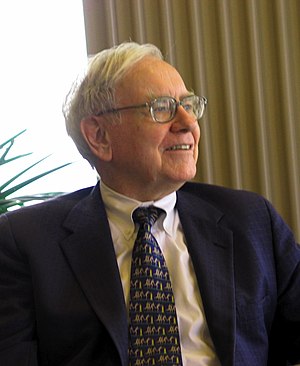| Warren Buffett speaking to a group of students from the Kansas University School of Business (Photo credit: Wikipedia) |
But unfortunately, from a wealth preservation standpoint, shareholders are entirely at the risk of Mr. Market. The shares currently trade at $93 per share. If the company falls to $70 per share in December 2013, shareholders will have to deal with the fact that the company is only worth 75% of what it was at the beginning of the year. With a non-dividend paying stock, there is no shield to limit Mr. Market's influence on a share price. I do not mean this as a dig at Berkshire. It's a fantastic company that increases book value by a rate noticeably higher than inflation every year, and it seems perfectly intelligent for a long-term investor to own Berkshire stock on the belief that the book value growth will be realized in the stock price over the long term. The point is, there is nothing about owning Berkshire Hathaway that offsets the influence that Mr. Market has on the value of his wealth invested in the firm.
On the other hand, some blue-chip stocks that pay healthy dividends offer a measure of protection against stock prices in determining total value. Let's take a look at Conoco Phillips (COP), which currently trades at $60, and pays out an annual $2.64 dividend per share. If you own 100 shares of Conoco, you will receive $264 in annual income (and possibly more, if Conoco raises its dividend this year and the investor chooses to reinvest the dividends received along the way). That mitigates the effect of Mr. Market somewhat. Assuming a tax optimal strategy, that $264 in annual income means that Mr. Market can knock the value of those 100 shares down to $57.36 at the end of the year for the investor to be in the same nominal situation that he is in today.This doesn't guarantee that an investor won't lose money in the stock market, but it makes Mr. Market fight harder to destroy your wealth.
The accumulation of a couple year's worth of dividends from a dividend growth company is all too often underrated. Nevertheless, it plays a real role in the short-term preservation of wealth over a one-to-three year period. In 2010, Johnson & Johnson (JNJ) paid $2.11 per share in dividends. In 2011, Johnson & Johnson paid $2.25 in dividends. And in 2012, the amount totaled $2.40 in dividends. That $6.76 in cash dividends over the past three years plays a meaningful role in diminishing Mr. Market's effect on your bottom-line.
In 2010, you could have bought shares of the stock for $60 per share. The purchase of 100 shares would have cost $6,000. But because you have three years worth of earnings growth that has gotten translated into higher dividends for the investor, the share price of Johnson & Johnson stock could have fallen from $60 per share to $53.24 for you to nominally break even. Of course, the company is up to $70 per share today, and the investor was able to enjoy $6.76 per share in cash dividends over that time frame, so it's effectively as if the stock is trading at $76.76 today from a total return perspective.
Most of us know that blue-chip investing can work incredibly well over long periods of time. But a stock that pays a 3-5% dividend that grows by at least 5% a year brings short-term advantages as well. It can be quite easy to underestimate the short-term power of dividends in protecting one's wealth from stock market fluctuations. If you think of each dividend check as a small rebate that allows the stock to fall a little bit below for you to still break even, then you may become more likely to pursue a strategy that does not give Mr. Market "the final say" in determining the entirety of what you're worth. Each dividend check makes it a little bit harder for stock market fluctuations to erode the wealth that you've entrusted to a particular company. ... Continue to read.

No comments:
Post a Comment